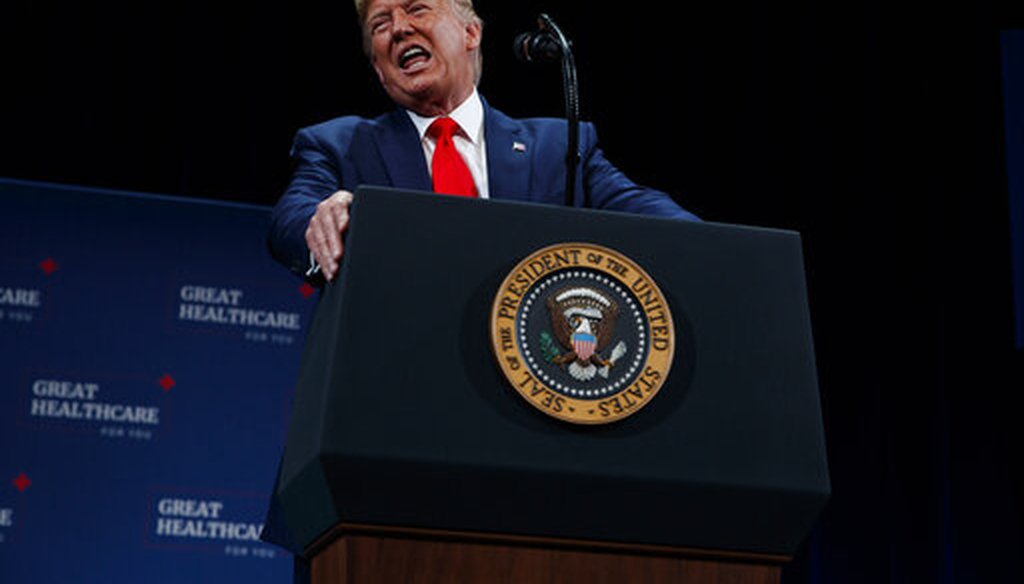Stand up for the facts!
Our only agenda is to publish the truth so you can be an informed participant in democracy.
We need your help.
I would like to contribute

President Donald Trump delivers remarks on Medicare at the Sharon L. Morse Performing Arts Center, Thursday, Oct. 3, 2019, in The Villages, Fla. (AP Photo/Evan Vucci)
President Donald Trump offered a preview of what his 2020 health agenda might look like in a speech Thursday — blasting Democratic proposals for reform and saying he would tackle issues such as prescription drug prices and affordability.
He outlined the pillars of his health care vision, which included protecting vulnerable patients; delivering affordable care and prescription drugs; providing choices and control; and improving care for veterans.
In the speech, delivered in The Villages, Fla., before the president signed an executive order to expand Medicare Advantage, Trump also took aim at overhaul plans being advocated by his Democratic opponents, claiming their approach would "put everyone into a single socialist government-run program that would end private insurance."
He said he and Republicans are committed to protecting people who have preexisting conditions — a claim that PolitiFact and Kaiser Health News previously rated False, because of his administration’s policies.
And, in keeping with the Medicare Advantage theme, he spoke about a controversial move by the Obama administration to reduce future payments to that program by $800 billion. (This point, previously examined by PolitFact, was found to be Half True — but Trump didn’t note that the reductions didn’t affect the program’s beneficiaries, or that he has used a similar approach in projecting future Medicare spending reductions.)
He challenged Congress to approve legislation to curb surprise medical bills and lauded improvements in the veterans’ health system.
But the speech included several other claims directed at Democrats and the currently buzzy proposal of "Medicare for All" that could easily have left some people befuddled. We broke down a few.
Trump told his audience that "Democrats are draining your health care to finance the open borders."
We asked the White House for the basis of this remark and never got a specific answer. But there are various issues to examine.
In August, the president argued that Democrats "support giving illegal immigrants free healthcare at our expense." But that isn’t accurate. The statement, part of a Trump 2020 television advertisement, was rated Mostly False.
That claim examined Democratic candidates who had said during one of the televised debates that their health care plans would provide coverage to undocumented immigrants. But the question posed by a debate host didn’t ask whether coverage would be free. In fact, multiple candidates said coverage for undocumented people would not be free. Some, meanwhile, include copays and deductibles in their health care proposals. Plus, if any Medicare for All plan was financed through, for instance, payroll taxes, undocumented immigrants would also be subject to paying those.
Trump argued that Democratic proposals for universal health care "would totally obliterate Medicare" — adding that "whether it’s single-payer or the so-called public option … they want to raid Medicare to fund a thing called socialism."
The argument here is nuanced but, fundamentally, Trump’s characterization misses the mark and is misleading.
The "single-payer" bill he refers to is the Medicare for All proposal pushed by Democratic Sens. Bernie Sanders of Vermont and Elizabeth Warren of Massachusetts. The bill would put all Americans — including the seniors currently covered by Medicare — into a single health plan. It would share Medicare’s name but look dramatically different: Unlike the existing program, the proposal envisions covering virtually all medical services and eliminating cost sharing. It would not be administered by private, for-profit contractors.
Predicting what this looks like is difficult since it’s grounded in hypotheticals. And one could argue that using the term "obliterates" is not completely off base because Medicare in its current form would no longer exist. But that misses the broader impact. Under the proposal as it’s written, seniors would be insured through a program at least as generous — if not more — than what they currently receive.
As for "public option" proposals put forth by candidates such as former Vice President Joe Biden and South Bend, Ind., Mayor Pete Buttigieg, they would leave Medicare more or less as it is, while also creating a public health plan uninsured people could buy into.
Describing Medicare for All, Trump said the plan would "reduce Americans’ household income by $17,000 a year."
We contacted the White House to find out the source of this number. The administration acknowledged receipt but never sent an answer.
That said, it’s unclear where this number comes from, because the evidence simply doesn’t exist to make such a precise claim. After all, many details about Medicare for All are still being worked out. That makes it exceptionally difficult to figure out how much such a system would cost — let alone how an individual household’s finances might change under such a system. (This ambiguity is why the Congressional Budget Office has declined to estimate single-payer’s fiscal impact.)
And different households would likely make out differently under Medicare for All. Some might end up paying more. But others would likely pay more in taxes while still seeing their health care costs go down — meaning they could ultimately save money.
Trump said, "the Democrat plans for socialized medicine will not just put doctors and hospitals out of business, they will also deny your treatment and everything that you need."
This statement relies on a talking point that’s been widely debunked.
We focused on the first part of this claim. Both conservatives and moderate Democrats have argued that single-payer health care, in particular, would drive hospitals and doctors to shutter en masse. (Conservatives have made this argument about a public option as well.) In a past related fact check, we rated this as False.
The argument springs from the way Medicare currently reimburses hospitals, at 87 cents for every dollar spent on health care. But the Sanders bill does not set a reimbursement rate, and instead would charge the federal government with devising an appropriate rate.
Some hospitals might struggle under a new system — but others, health care economists have previously told us, would likely do better.
"It really depends on which hospitals you’re talking about," Gerard Anderson, a health policy professor at Johns Hopkins University and an expert in hospital pricing, told Kaiser Health News in July.
Our Sources
See fact-checks.







































